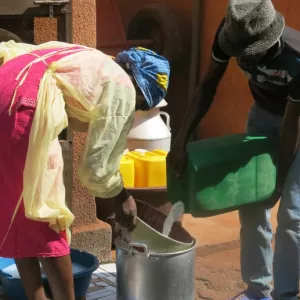Towards an Agroecological Dairy Value Chain in Burkina Faso: Promising Results from the Bobo-Dioulasso Dairy Innovation Platform
Strong partner leadership, better connection between value chain actors, and increased milk production among achievements A Bit of Context In Burkina Faso, agroecology has gained visibility in scientific and political debates on agriculture. However, environments conducive to the widespread implementation of agroecological practices remain limited, despite the benefits shown in several specific contexts. Research into agroecology has tended to focus

Towards an Agroecological Dairy Value Chain in Burkina Faso: Promising Results from the Bobo-Dioulasso Dairy Innovation Platform
Strong partner leadership, better connection between value chain actors, and increased milk production among achievements
A Bit of Context
In Burkina Faso, agroecology has gained visibility in scientific and political debates on agriculture. However, environments conducive to the widespread implementation of agroecological practices remain limited, despite the benefits shown in several specific contexts. Research into agroecology has tended to focus more on technical aspects than on the socio-political dimensions involved in improving the socio-technical system beyond individual farms.
The CGIAR Initiative on Agroecology, led by the French Agricultural Research Centre for International Development CIRAD and its partners, the International Center for Research and Development on Livestock in Sub-humid Zones CIRDES and the Institute of Environment and Agricultural Research INERA, established the Agroecological Living Landscape (ALL) in the Hauts Bassins region of Western Burkina Faso in March 2023. This initiative currently includes dairy farmers, collectors affiliated with milk collection centers, private collectors, dairy processing units, government support services (local departments of the Ministry in charge of livestock, farming research, technological research), private providers (livestock feed suppliers, artificial insemination service providers, microfinance institutions), NGOs and research institutes. Agroecological transitions are driven by Bobo-Dioulasso’s Dairy Innovation Platform (‘Plateforme d’Innovation Lait’, PIL), which aims to sustain and amplify project achievements over time.
Earlier this year, the coordination team took stock of its activities with ALL stakeholders, including all the researchers involved in the implementation of the project as well as ALL-BF stakeholders.
A Shared Vision for Change
Stakeholders have a clear idea of the changes they aspire to achieve to enable agroecological transitions in the dairy value chain:
- Dairy farmers adopt the agroecological package (Fodder Demo-Plot, manure pit, reasoned co-product management (with the CoProdScope tool), reasoned dry-season dairy rationing (with the Jabnde tool).
- Milk collectors provide a range of services to farmers (consultation, advice, access to agroecological inputs) and processors (guaranteed deliveries in terms of quantity and quality, quality control, etc.).
- Dairy processors diversify dairy products (dairy products with natural flavors based on local non-timber forest products (NTFP): néré (Parkia biglobosa), kinkéliba (Combretum micranthum), moringa (Moringa oleifera), etc.).
- Consumers: (i) demand more dairy products made from local milk at affordable prices; (ii) replace milk powder with local milk in dairy products; (iii) diversify Dèguè, Gapal, Wagashi, Soap, Oil, and various innovative products.
First Results
Discussions revealed that the quantity of local milk produced in the Bobo-Dioulasso dairy production area rose from 1,127 L/d in 2020 to 6,830 L/d in 2023, thanks to (i) the involvement of research projects, (ii) government support, particularly in the form of inputs for dairy farmers, and (iii) the end of COVID-19. Preliminary data for 2024 show a further increase in the quantity of milk produced per day, thanks in particular to the agroecological package co-developed with researchers from the Initiative on Agroecology and implemented on dairy farms.
Regarding the ongoing implementation of Experimental Agroecological Farming Schemes, farmers expressed that they are equipped with the tools needed to maintain these innovations and further boost milk production in the Bobo-Dioulasso dairy production area. They also expressed their willingness to pass on the knowledge they acquired to their peers, so that they too can increase milk production on their respective farms.
Testimonials
During the workshop, participants of the Milk Collection Centers (MCC) and Cooperative Societies (SCOOP) expressed how they experienced the innovations:

Read the full report:
Sib, O.; Orounladji, B.M.; Ouattara, S.D.; Traore, I.; Sanogo, S.; Vall, E. (2024) Analyses Coûts-bénéfices des packages agroécologiques chez les producteurs, les collecteurs et les transformateurs de la chaîne de valeur lait de Bobo-Dioulasso. 36 p.

